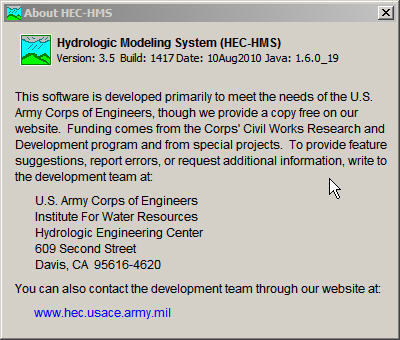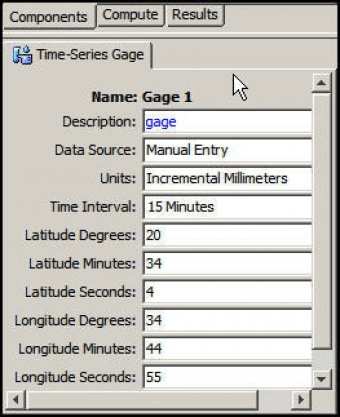Download PDF - Hec-hms Users Manual 4.2 x4e6zr1ov9n3. 2008 Columbia Road Wrangle Hill, DE 19720 +302-836-3880 email protected. HEC-HMS - Free download as Powerpoint Presentation (.ppt), PDF File (.pdf), Text File (.txt) or view presentation slides online. Hydrologic Modeling System HEC-HMS User's Manual Version 4.2 August 2016 US Army Corps of Engineers Institute for Water Resources Hydrologic Engineering Center 609 Second Street Davis, CA 95616 USA Phone 530.756.1104 Fax 530.756.8250 Email email protected Hydrologic Modeling System HEC-HMS, User's Manual 2016. Download file PDF Read file. The program interface. This project developed a HEC-RAS and HEC-HMS model of an existing tide gate structure and its upland drainage area in the New.
FAQs
Are online degrees respected?
As more and more trusted schools offer online degree programs, respect continues to grow. ... According to a survey, 83 percent of executives say that an online degree is as credible as one earned through a traditional campus-based program.
Hec Hms 4.2 Download Windows
Are online degrees recognized?
Generally, any accredited degree offered by an institution of higher education certified as such within in a major country will be recognized as a valid degree. ... Online degrees are relatively new in higher education, and still evolving.

Can I get a degree online?
To get a degree online, research on the internet to find an online course in the subject you want to study. For example, you might be able to study at an established university that offers online courses for out of state students. Alternatively, try exploring what online universities have to offer.
Is financial aid available?
Just as financial aid is available for students who attend traditional schools, online students are eligible for the same – provided that the school they attend is accredited. Federal financial aid, aid on the state level, scholarships and grants are all available for those who seek them out. Here’s what students need to know about financial aid for online schools.
Whew! I feel like I'm the first person to crack this HEC-HMS XSL Style Sheet nut. In any case I'm the first one to share it on the web.First of all, before diving into how to get a report using a Style Sheet, you should realize that a sort of basin model report from HEC-HMS is available as a readable text file in the .basin file. But beyond that, for the purposes and in the hope that we users would develop tabular reports, the HEC also provided a report definition language (that they didn't document very well) for reports we can get from the Tools, Reports menu.
I was able to create an SCS Basin Summary style sheet by using the 'tags' in the .basin file, making them lower case and removing spaces from them. Here's an example of how I added the Curve Number to my report:
1. The sample Snyder report provided by the HEC includes this snippet
2. My .basin file includes this snippet
3. I turned 'Curve Number' from step 2 into curvenumber below. I continued that way to use the example of the .basin file and correct (with some oddities) the table HTML to create an SCS Basin table as shown below:
And here is the complete file I saved as SCSBasinSummary.xsl
 And here is the resulting report :-) :
And here is the resulting report :-) :Basin Model 'Bisbee Tailing 071609'
| Subbasin | Area | SCS CN | SCS Lag |
|---|---|---|---|
| SCTSA Top Basin | 0.2149 | 87 | 17.7 |
| SCTSA Top Pond 1 | 0.1548 | 87 | 24.1 |
| SCTSA Top Pond 2 | 0.1345 | 87 | 28.8 |
| SCTSA Top Pond 3 | 0.0877 | 87 | 24.7 |
| SCTSA TOE-1 | 0.0895 | 87 | 9.4 |
| W Natural Ground 1 | 0.0831 | 87 | 11.7 |
| SCTSA Main 2 WS | 0.01259 | 87 | 11.0 |
| SCTSA-W3 | 0.0079 | 87 | 3.2 |
| SCTSA-W1 | 0.0073 | 87 | 3.2 |
| SCTSA Main 3 WS | 0.0327 | 87 | 8.7 |
| HR 1 | 0.0168 | 87 | 1.5 |
| SCTSA-S3 | 0.0135 | 87 | 4.3 |
| SCTSA-S4 | 0.0125 | 87 | 4.1 |
| SCTSA-S2 | 0.0058 | 87 | 2.6 |
| SCTSA-S1 | 0.0053 | 87 | 2.3 |
| SCTSA-S5 | 0.0166 | 87 | 4.8 |
| SCTSA-S6 | 0.0132 | 87 | 3.2 |
| SCTSA-S7 | 0.0168 | 87 | 6.1 |
| HP-1 | 0.047 | 87 | 6.3 |
| SCTSA-S8 | 0.0217 | 87 | 5.3 |
| Upstream Natuural | 0.6291 | 87 | 15.3 |
| NCTSA Top | 0.2581 | 87 | 18 |
| NCTSA-E3 | 0.0289 | 87 | 5.3 |
| NCTSA-E5 | 0.0083 | 87 | 3.6 |
| NCTSA-E2 | 0.0050 | 87 | 3.8 |
| NCTSA-E1 | 0.0033 | 87 | 2.2 |
| NCTSA-E4 | 0.0022 | 87 | 2.9 |
| SCTSA-E3 | 0.0108 | 87 | 6.5 |
| NCTSA Main 4 WS | 0.0055 | 87 | 2.5 |
| NCTSA Main 5 WS | 0.0162 | 87 | 2.9 |
| SCTSA-E2 | 0.0123 | 87 | 5.7 |
| NCTSA Main 6 WS | 0.0097 | 87 | 4.2 |
| SCTSA-E1 | 0.0060 | 87 | 4.5 |
| NCTSA Main 7 WS | 0.0075 | 87 | 2 |
| SCTSA-E0 | 0.0022 | 87 | 2.9 |
| NCTSA Main 8 WS | 0.0057 | 87 | 1.9 |
| HR-2 | 0.0097 | 87 | 1.5 |
| HP-2 | 0.0475 | 87 | 3.9 |
| SCTSA-E4 | 0.0070 | 87 | 1.6 |
Here's another one that reports both SCS and Green-Ampt and Clark:
<table border='2' width='100%'>
<tr>
<th></th>
<th>Subbasin</th>
<th>Area</th>
<th>SCS CN</th>
<th>SCS Lag</th>
<th>GA IC</th>
<th>GA SC</th>
<th>GA Suction</th>
<th>GA Conduct.</th>
<th>GA %Imp.</th>
<th>Clark TC</th>
<th>Clark R</th>
</tr>
<xsl:for-each select='/HMS:basin/HMS:subbasin'>
<tr>
<td><xsl:apply-templates select='.'/></td>
<td><xsl:apply-templates select='./HMS:area'/></td>
<td><xsl:apply-templates select='./HMS:lossrate/HMS:curvenumber'/></td>

Hec Hms 4.2 Free Download
<td><xsl:apply-templates select='./HMS:transform/HMS:lag'/></td>Hec Hms 4.2 Download
<td><xsl:apply-templates select='./HMS:lossrate/HMS:initialcontent'/></td>
<td><xsl:apply-templates select='./HMS:lossrate/HMS:saturatedcontent'/></td>
Hec Hms 4.2 Download Free
<td><xsl:apply-templates select='./HMS:lossrate/HMS:wettingfrontsuction'/></td><td><xsl:apply-templates select='./HMS:lossrate/HMS:hydraulicconductivity'/></td>
<td><xsl:apply-templates select='./HMS:lossrate/HMS:percentimpervious area'/></td>
<td><xsl:apply-templates select='./HMS:transform/HMS:timeofconcentration'/></td>


<td><xsl:apply-templates select='./HMS:transform/HMS:storagecoefficient'/></td>
</tr>
</xsl:for-each>
</table>
